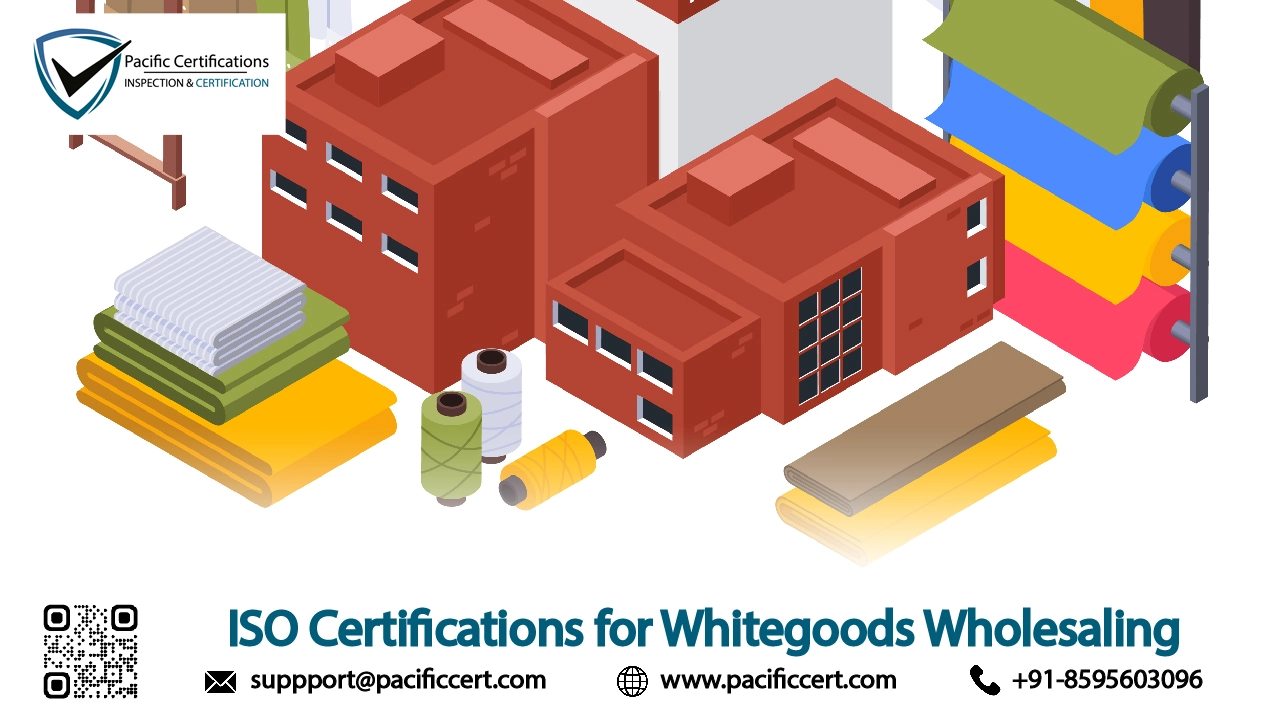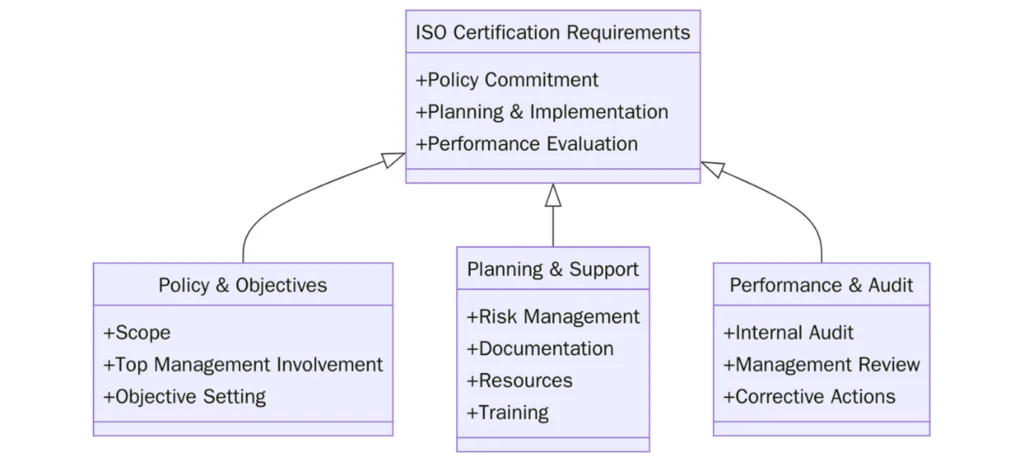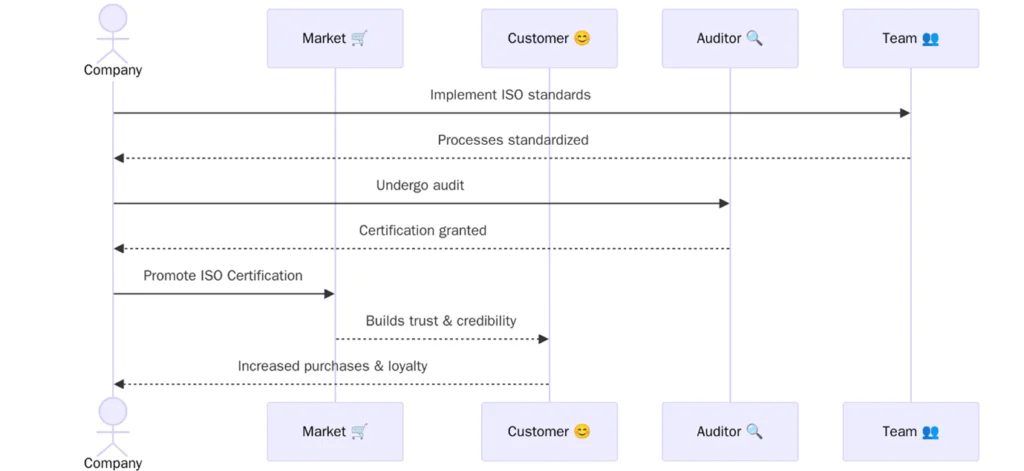ISO Standards for Whitegoods Wholesaling

In today’s global marketplace, whitegoods wholesalers must go beyond mere supply chain efficiency and pricing competitiveness. For businesses involved in wholesaling major household appliances—such as refrigerators, washing machines, air conditioners, and more, ISO standards provide structured frameworks that boost quality, environmental compliance, safety, and customer satisfaction.
ISO, develops globally recognized standards that ensure products and services are safe and of high quality. In the whitegoods sector, where reliability and after-sales service significantly impact brand reputation and consumer loyalty, adhering to ISO standards is a strategic necessity.
Whether dealing with logistics, warehousing, procurement, or customer service, ISO standards create a foundation for consistency and regulatory compliance.
If you are looking for ISO certification for Whitegoods Wholesaling, reach out to us at support@pacificcert.com. For more details, visit www.pacificcert.com.
Applicable ISO Standards for Whitegoods Wholesaling
Wholesalers of large appliances operate in a dynamic environment where product performance, safety, and environmental considerations converge. The following ISO standards are particularly relevant:
ISO 9001:2015 – Quality Management Systems
Ensures continuous improvement and customer satisfaction. Critical for managing supply chains, customer feedback, and service delivery.
ISO 14001:2015 – Environmental Management Systems
Helps organizations reduce their environmental impact, manage waste, and improve sustainability in packaging and logistics.
ISO 45001:2018 – Occupational Health & Safety Management
Ensures safe working environments across warehouses, delivery operations, and offices.
ISO 50001:2018 – Energy Management Systems
Relevant for facilities managing high-energy-consuming equipment like HVAC systems or large-scale refrigeration.
ISO 27001:2022 – Information Security Management Systems
Crucial for protecting customer data, order management systems, and digital procurement platforms.
ISO 31000 – Risk Management
Helps anticipate operational, financial, and reputational risks in global supply chains.
ISO 26000 – Social Responsibility (Guidance Only)
While not certifiable, it provides direction on ethical operations, particularly useful for brands emphasizing corporate responsibility.
Click here to find out more applicable standards to your industry
Requirements of ISO Certifications for Whitegoods Wholesaling
To meet the growing expectations of buyers, regulators, and retailers, whitegoods wholesalers must follow structured practices that support safety, product quality and consistent delivery. ISO certifications provide a reliable foundation for managing these responsibilities. By adopting relevant ISO standards, wholesalers can set clear guidelines for handling inventory, storing appliances, managing supplier relationships and improving customer satisfaction. These requirements act as a roadmap for aligning daily operations with international benchmarks. Below is a brief breakdown of the key requirements for each ISO standard applicable to Whitegoods Wholesaling:

ISO 9001:2015 – Quality Management Systems
Deliver products/services that meet customer and legal requirements.
Management must commit to a clear vision and quality objectives.
Identify and manage interrelated processes effectively.
Embed mechanisms for performance improvement.
Use data to drive decisions.
Train and involve competent staff.
ISO 14001:2015 – Environmental Management Systems
Establish a documented commitment to environmental protection.
Identify and follow applicable environmental laws and regulations.
Evaluate activities affecting the environment (e.g., waste, emissions).
Set measurable goals to reduce impact.
Manage high-risk operations to minimize pollution.
Plan for environmental incidents (e.g., chemical spills).
ISO 45001:2018 – Occupational Health & Safety Management Systems
Spot workplace hazards proactively.
Assess and control health and safety risks.
Engage employees in OH&S matters.
Meet safety laws and regulatory obligations.
Develop and test safety incident response plans.
Identify root causes and prevent recurrence.
ISO 50001:2018 – Energy Management Systems
Create a plan focused on energy performance.
Review and document energy usage patterns.
Track energy consumption and efficiency.
Optimize energy-intensive processes (e.g., lighting, HVAC).
Continuously monitor energy usage for improvement.
ISO 27001:2022 – Information Security Management Systems
Define clear rules to protect information assets.
Identify and classify information assets (e.g., data, servers).
Grant access only to authorized personnel.
Assess and mitigate information security threats.
Establish procedures to handle data breaches.
Adhere to legal and contractual IT security requirements.
ISO 31000 – Risk Management Guidelines
Spot potential risks in logistics, finances, compliance, etc.
Understand consequences and likelihood of risks.
Prioritize risks based on their impact.
Choose actions to mitigate or transfer risk.
Regularly assess risk controls and their effectiveness.
Keep stakeholders informed on risks and responses.
Achieve globally recognized ISO certification for your whitegoods wholesale operations. Contact our expert team at support@pacificcert.com!
What are the benefits of ISO Certifications for Whitegoods Wholesaling?
Achieving ISO certification offers tangible and strategic advantages:

Efficiency
Structured procedures reduce redundancy, delays, and errors in inventory or delivery management.
Market Access
ISO certification improves the likelihood of successful partnerships, tenders, and entry into regulated markets.
Customer Trust
Certified entities demonstrate a commitment to quality and accountability, improving retention and referrals.
Environmental Impact
ISO 14001 and 50001 help organizations cut waste and optimize energy usage, aligning with sustainability goals.
Safety
A certified OHSMS reduces workplace accidents, insurance claims, and downtime, protecting both staff and brand equity.
Data Security
ISO 27001 builds trust in online systems, protecting business data from breaches and cybercrime—an increasing threat in 2025’s digital economy.
As per a recent market study, ISO-certified whitegoods wholesalers are seeing a 15–20% increase in supply chain efficiency due to the adoption of digital inventory systems that align with ISO 9001 and ISO 27001. Furthermore, global retailers are demanding ISO 14001 as part of green procurement initiatives, compelling wholesalers to integrate sustainability into logistics planning.
With smart appliances on the rise and ESG compliance becoming mainstream, ISO certifications are more than operational tools—they are branding assets.
Contact us
As a trusted certification body, Pacific Certifications specializes in conducting thorough audits and issuing certificates of conformity. While we do not engage in consulting, training, or implementation services, we excel in independently assessing compliance based on the chosen ISO standards.
Our approach is strictly objective, following internationally accredited auditing processes to validate whether your systems meet ISO benchmarks. This assurance helps your brand gain trust from clients, government bodies, and international partners.
Looking to ensure compliance and build customer trust with ISO standards? We can help! Email support@pacificcert.comor explore our services at www.pacificcert.com.
FAQ: ISO Certifications for Whitegoods Wholesaling
What is ISO certification in whitegoods wholesaling?
ISO certification confirms that a whitegoods wholesaler adheres to international standards for quality, safety, environmental responsibility, and operational efficiency.
Is ISO certification mandatory for wholesalers?
While not mandatory, many large retailers, government contracts, and international buyers require or prefer suppliers to be ISO certified.
How long does the certification process take?
Depending on organizational size and readiness, it typically takes 3 to 6 months to achieve certification after the initial audit begins.
Can Pacific Certifications help with implementation or training?
No, We only perform audits and issue certifications. For training or implementation, you should consult third-party experts.
Which ISO is most important for whitegoods businesses?
ISO 9001 (quality) and ISO 14001 (environment) are typically foundational. Others depend on your operations and goals.
What happens during the ISO audit?
Auditors from Pacific Certifications will evaluate your documentation, interview employees, and review processes to ensure conformity with ISO standards.
Ready to get ISO certified?
Contact Pacific Certifications to begin your certification journey today!
Suggested Certifications –
Read more: Pacific Blogs






